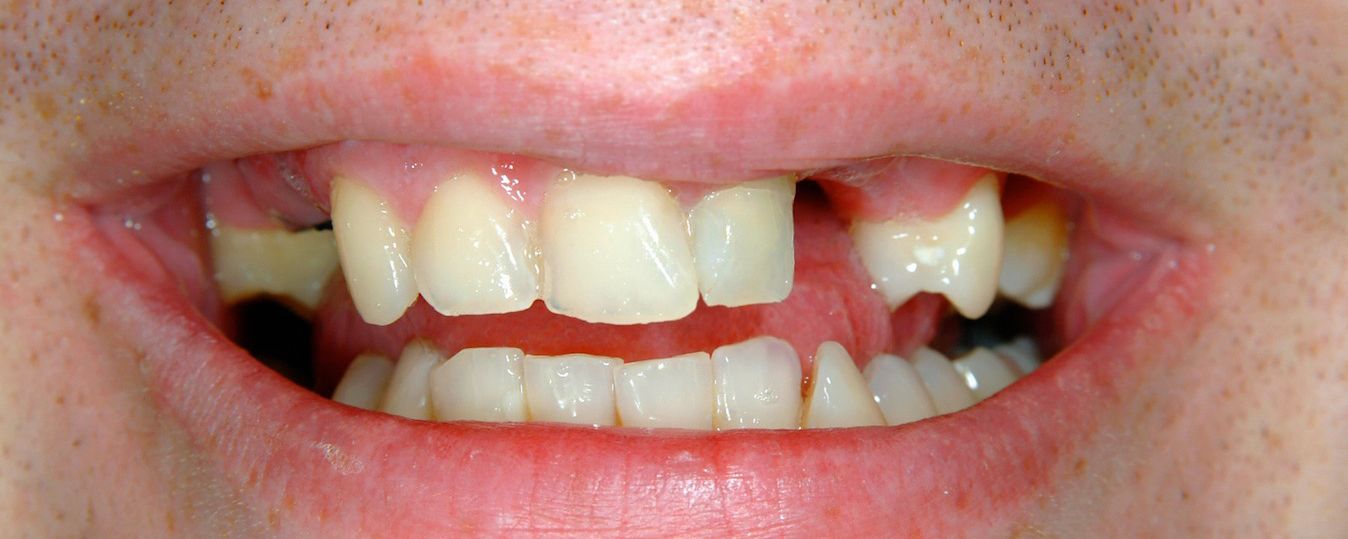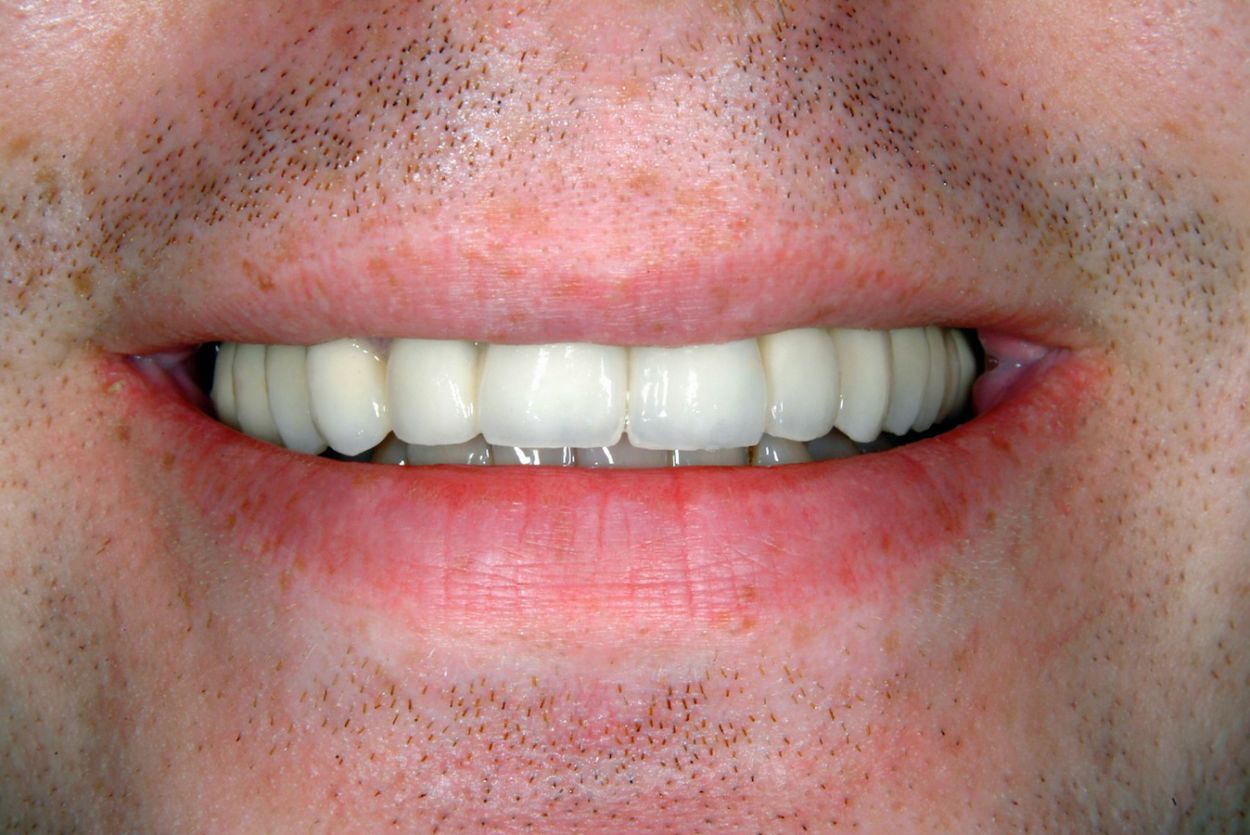
All-on-4 Dental Implant Questions Answered By A Real Dentist
Posted on April 02 by Dr Andrew Nesbitt
Beyond the practical benefits, the emotional impact cannot be overstated as patients regularly describe regaining their confidence and social comfort after treatment.
Many speak of being able to laugh freely without covering their mouth or enjoying meals in public without anxiety for the first time in years. The psychological transformation that comes with a new, natural-looking smile often leads to improved personal and professional relationships as patients no longer feel defined by their dental problems.
All-on-4 doesn't just restore teeth, but helps restore quality of life by eliminating the daily reminders and limitations that come with tooth loss.
With Dr. Nesbitt’s experience in complex oral surgery and his use of CBCT scanning and digital workflows, the planning and fitting process is both swift and precisely tailored to your bone contours. The usual process from initial consultation to final restoration typically takes a few months, with most of that time being healing period.

Say goodbye to the dreaded injection pain. Our medical-grade anesthetic paste ensures completely pain-free injections, making your treatment more comfortable from start to finish. Dental implants are the gold standard in tooth replacement, offering a permanent, natural-looking solution to missing teeth. We perform the entire process in-house, from surgery to prosthetics, helping you restore your smile, prevent bone loss, and improve facial aesthetics.
Can I get All on 4 with the NHS? Can I pay for Private NHS Implants?
All-on-4 dental implants are not standard NHS dental services as they're considered an advanced, made-to-measure treatment beyond routine dental care.
The NHS does provide basic dental implant treatment in specific circumstances, such as for patients who cannot wear conventional dentures due to severe ridge resorption or those who have lost teeth through trauma or oral cancer, but All-on-4 specifically is generally not included in these provisions.
Procedures
While NHS dentists can offer private services alongside their NHS work, the All-on-4 procedure requires specialised training and equipment that not all NHS practices have available. If you're interested in exploring All-on-4 through an NHS dentist who also offers private treatment, you would essentially be receiving private treatment at their practice rather than an NHS reduced rate


Can I get All on 4 with the NHS? Can I pay for Private NHS Implants?
All-on-4 dental implants are not standard NHS dental services as they're considered an advanced, made-to-measure treatment beyond routine dental care.
The NHS does provide basic dental implant treatment in specific circumstances, such as for patients who cannot wear conventional dentures due to severe ridge resorption or those who have lost teeth through trauma or oral cancer, but All-on-4 specifically is generally not included in these provisions.
Procedures
While NHS dentists can offer private services alongside their NHS work, the All-on-4 procedure requires specialised training and equipment that not all NHS practices have available. If you're interested in exploring All-on-4 through an NHS dentist who also offers private treatment, you would essentially be receiving private treatment at their practice rather than an NHS reduced rate
General Questions About Dental Professionals in the UK
1. What are the different types of dental professionals in the UK?
Dentists, dental nurses, dental hygienists, dental therapists, orthodontists, periodontists, and maxillofacial surgeons all play different roles. Each has specific training and responsibilities within a dental practice. Visit the General Dental Council (GDC) for the full list of recognised dental roles.
2. What’s the hierarchy of dental staff in an NHS or private practice?
At the top are dental surgeons and specialists, followed by general dentists, then dental hygienists and therapists, with nurses and administrative staff supporting the clinical team.
3. What’s the difference between a dentist and a dental specialist?
A dentist handles general oral health care, while a specialist has extra training in a specific field such as orthodontics, periodontics, or endodontics. Learn more about gum disease and periodontal care.
4. Who works in a dental surgery apart from the dentist?
You’ll also find dental nurses, hygienists, therapists, receptionists, and sometimes treatment coordinators and practice managers.
5. What is the role of a dental nurse in the UK?
Dental nurses support the dentist during procedures, maintain sterilisation, manage records, and help put patients at ease.
6. What’s the difference between a dental hygienist and a dental therapist?
Hygienists focus on gum health and prevention. Therapists can also do fillings, baby tooth extractions, and more advanced hygiene treatments. Explore how hygienists help maintain oral health.
Questions About Dental Surgery and Treatments
7. Which dental procedures require a specialist referral?
Treatments like orthodontics, complex extractions, root canals, and implant placements often need referral to a specialist.
8. Can a general dentist remove wisdom teeth?
Yes, if the extraction is straightforward. More complex cases may be referred to a specialist oral surgeon. Check NHS dental treatment guidelines.
9. When would I need a referral to a specialist dentist?
If your condition requires advanced care or equipment a general dentist doesn’t offer, they’ll refer you for specialist treatment.
10. What kind of dental surgery is available on the NHS?
Routine treatments, extractions, and some surgeries are available, depending on clinical need and severity. Implants are usually private. View NHS dental services.
11. Do dentists perform extractions, or do I need a specialist?
Most extractions are done by dentists. Complex or impacted teeth might be referred out.
12. What is a maxillofacial surgeon, and what do they do?
These are hospital-based specialists dealing with jaw alignment, facial trauma, cancer surgery, and complex wisdom tooth removals.
13. What’s the difference between a periodontist and a normal dentist?
A periodontist focuses on gum disease and dental implants, while a general dentist provides broader dental care. Read about the signs and symptoms of gum disease.
14. Who do I see for dental implants in the UK?
Implants are usually provided by dentists with additional training or by periodontists and prosthodontists. Learn about fast and fixed implant options.
Whether dining at a restaurant or enjoying social occasions, implants give you the freedom to eat with confidence. With dental implants, you can restore your smile, improve your nutrition, and enhance your overall well-being, allowing you to enjoy life to the fullest. Here's some additional content topics (match them to the different sections) CBCT Scanner – Detailed 3D Imaging for Precision Planning
We are the only practice in the Lichfield area with a CBCT (Cone Beam Computed Tomography) scanner, allowing us to capture detailed 3D x-rays of your jaw and teeth. This technology is essential for planning complex treatments like dental implants, ensuring optimal results with accurate assessments of bone structure and tooth positioning.
Qualifications and Training Questions
15. What qualifications do you need to be a dentist in the UK?
You must complete a five-year Bachelor of Dental Surgery (BDS) degree and register with the General Dental Council (GDC). GDC student training information.
16. How do you become a dental hygienist in the UK?
Complete a two- or three-year diploma or degree in dental hygiene from a GDC-approved institution.
17. Can a dental nurse become a dentist?
Yes, with the appropriate qualifications. Many start as nurses and go on to study dentistry at university.
18. How long does it take to train as a maxillofacial surgeon?
It requires both medical and dental degrees, plus surgical training. It can take over 10 years in total.
19. Do dental therapists do fillings?
Yes, dental therapists are trained to do fillings, especially in children and for less complex adult cases.
20. Are all dentists in the UK GDC-registered?
Absolutely. It's a legal requirement to practise dentistry in the UK. Check if your dentist is registered.
Common Patient Questions
21. Do I need a referral to see a dental specialist?
Usually, yes. Your general dentist will refer you based on your treatment needs.
22. Who do I see for gum disease treatment?
Start with your general dentist. If advanced care is needed, they may refer you to a periodontist. Explore our gum disease care guide.
23. Can a dental hygienist spot cavities?
They can flag potential issues, but only a dentist can officially diagnose and treat tooth decay.
24. When should I see a periodontist?
If you have persistent gum problems, loose teeth, or are considering implants, a periodontist is the specialist to see.
25. What dental treatments are covered by the NHS?
Treatments deemed clinically necessary—like check-ups, fillings, and extractions—are usually covered. Find out what’s included in NHS dental care.
26. What counts as a dental emergency in the UK?
Severe pain, swelling, bleeding, or trauma to the face or mouth that needs urgent attention. NHS emergency dental guidance.
27. How much does private dental treatment cost?
It varies by procedure and practice, but expect to pay more than NHS charges. Always ask for a price list up front. Understand the risks of cheap dental alternatives.
